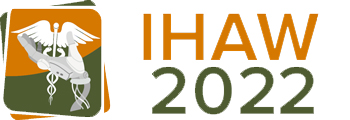Call for Papers
CALL FOR LATE BREAKING RESULTS
IHAW 2022 accepts now submissions for late breaking results. The instructions to authors remain the same, as for the regular submissions. Accepted papers will be published in the same proceedings volume with the regular submissions and will be eligible both for the Best Paper Award and to be selected for the special journal issues that will be prepared after the conference. The important dates are as follows:
Submission Deadline for Late Breaking Results: November 1, 2022 (AoE)
Notification of Acceptance/Rejection: November 15, 2022
Camera-Ready Submission and Author Registration: November 25, 2022
Conference presentation
ICT for Health, Accessibility and Wellbeing (IC-IHAW 2022) is the second of the series of International Conferences on « ICT for Societal Challenges ». It is a showcase for high quality oral and poster presentations and demonstrations sessions.
This conference aims to be a platform for multi and interdisciplinary research at the interplay between Information and Communication Technologies, Biomedical, Neuro-cognitive, and Experimental research.
This research includes the design, experimental evaluation and standardization of new ICT in-silico scalable systems for new and future inclusive and sustainable technologies that benefit all: healthy people, people with disabilities or other impairments, people having chronic diseases, etc. User-centered design and innovation, new intuitive ways of human-computer interaction, and user acceptance are the topics of particular interest.
Conference topics
Relevant topics include (but are not limited to) the following:
Artificial Intelligence, Computation and Data Analytics
- Artificial Intelligence methods for medical device testing.
- Algorithms, methods and services for condition-specific intervention (e.g., diabetes, obesity, dementia, post cancer treatment, allergies, mental health).
- Algorithms, methods and services for predicting and monitoring infectious disease.
- Crowd-sourcing and social media analysis for predicting and monitoring infectious disease.
- Medical Data and/or Medical Image Analysis.
- Electronic Medical Records Analysis.
- Computational methods for medical devices.
Human Computer Interaction and Cognition
- Human-Machine Interaction for healthcare and well-being.
- Cognitive Mechatronics for healthcare and well-being.
- Models for human-device interaction for medicine.
- Cobotics for healthcare and well-being.
- Model-based design and configuration tools for healthcare and well-being.
Assistive Devices
- Precision medicine.
- ICT for in-silicon trials.
- Implantable medical devices.
- Multimodal assistive ICT devices to empower people with sensory, cognitive, motor, balance and spatial impairments.
ICT & Wellbeing
- Age-friendly systems for active and healthy ageing (telepresence, robotics solutions, innovative solutions for independent living, innovative elderly care, integrated care, age-related risks prevention/detection).
- ICT systems to improve the quality of life and for daily life activities assistance (education, recreation, and nutrition).
- Smart living homes and wearables (Intelligent and personalized digital solutions for sustaining and extending healthy and independent living; personalized early risk detection and intervention).
- Smart Systems and services promoting access to the socio-economical and cultural environment.
- IoT and smart real-time surveillance systems for monitoring, auditing and control to prevent the spread of the pandemic.
- eHealth smart solutions in the fight against a COVID-19 like pandemic.
- IoT and Smart Healthcare systems with an environmentally friendly and sustainable footprint.
Health Infrastructure and Healthcare Operation Services
- Distributed and connected digital healthcare services.
- IoT services for real-time monitoring of health data and status of patients and/or older adults.
- Wearable devices and IoT systems for remote monitoring of health data and status of patients and/or older adults.
- mHealth services and applications using mobile and wearable devices to collect community and clinical health data, and deliver healthcare information to practitioners, researchers and patients.
- Sustainable city environments for emergency health management.
- 5G and beyond for healthcare in sustainable smart cities.
- Wireless Sensor Networks for advanced smart healthcare in sustainable cities.
Quality in Healthcare Systems
- New experimental validation methods with end-users.
- Systems and services for ensuring patient’s commitment to the medication schedule.
- Digital health systems and tools for health care professional training and workforce development.
- Communication systems and services improving the quality of patient and healthcare provider contact before, during and after admission.
- Methods and Technology for Improving the quality of services-oriented care delivery systems.
- Methods, Digital Tools and/or Services for inclusive-for-all healthcare systems.
- Co-Creation of healthcare systems for social well being of people with special needs, older adults and/or deprivileged or disadvantaged people.
- Systems for management of health and care (mental health, pain, neurological disorders, sight, hearing, balance, space awareness; sensory based physiological and psychological non-invasive measurements, preventive healthcare, m-healthcare, e-healthcare, integrated care, serious games, electronic health record, self-management, patient-centered systems for survivorship, palliation and/or end-of-life care).
Privacy, Security & Standardization
- Standardization, certification, labelling, and communication issues (related to ageing well, to sensory impairment).
- Privacy and Security/Regulation compliant services in health care systems (e.g., HIPAA).
- Security and privacy of digital health systems and service.
- Socio-economic issues of smart healthcare in sustainable societies.
- Privacy, security and ethics in eHealth smart solutions and surveillance at scale in the fight against a COVID-19 pandemic.
High-quality original submissions that address such future issues, show the design and evaluation in (near-)real scenarios, explain how to benchmark systems, and outline the education and training procedures for acquiring new perceptual skills while using such systems are welcome. Research and technical papers are expected to present significant and original contributions validated with the targeted end-users. Early works and works-in-progress are invited to submit a short or demo paper.
Submissions should clearly state the progress beyond the existing state-of-the-art and the expected societal benefits of the developed technology. When possible, validate scenarios with the target user groups and well-identified technology readiness levels (TRL) should be at least outlined.
Journal Special Issue
The authors of the best papers accepted and presented at IHAW 2022 will be invited to submit extended versions of their papers for further review and possible inclusion in either of the two Special Issues that the conference will organise with the following journals:
* SN Computer Science, Springer
* Smart Health, Elsevier

